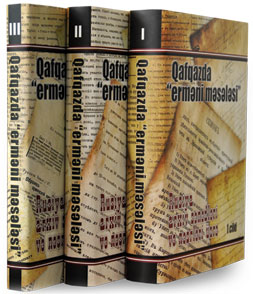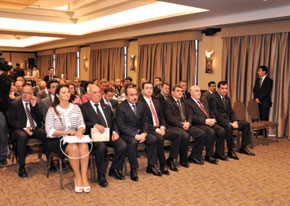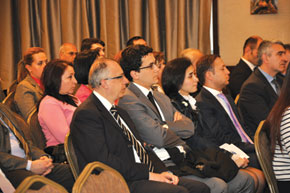 Pages 12-15
Pages 12-15 On 21 April, The European Azerbaijan Society (TEAS) presented its latest book to a distinguished audience of Azerbaijanis and expatriates in Baku’s Hyatt Regency Hotel. In attendance were politicians, government officials, academics, journalists, business people and students.
The book, The Armenian Question in the Caucasus: Russian Archive Documents and Publications, in three volumes, was presented in Azerbaijani and Russian language versions. An English language version will be available from 1 June.
Welcoming guests, TEAS founder and chairman Tale Heydarov, who is editor of the book, said that the aim of the organisation was to introduce the economic opportunities and culture of Azerbaijan to a wider European audience. He explained that the book was part of TEAS’s principal task to inform the international community about the main problem facing Azerbaijan – the Nagorno-Karabakh conflict. The problem had a long history and the role played by the Armenians in the region had long been discussed. At the heart of the new book, he said, were documents recovered from the military archives in Russia, many of which were being published for the first time in this book and which give first-hand information about the origins of The Armenian Question during the Russian empire.
Prof. Yagub Mahmudov, Director of the Institute of History at the Academy of Sciences, welcomed the publication of original documents showing how the Armenian state was built during the 19th century on lands inhabited by Azerbaijanis. He said that the Academy was also researching this area and he encouraged TEAS to look even further afield, to western archives, for information on this subject of so much importance to the current political situation in the Caucasus.
Editor of the magazine Visions of Azerbaijan, Ian Peart, believed that the value of the book lay in its authentic materials. In a month when the events of 1915 were being raised again, he was concerned that politicians were playing political games with issues on which they had little factual information. He urged historians to use authentic materials, like those in these volumes, to present objective research and put an end to the harmful political posturing.
The final speaker was Ali Hasanov, Head of the Department of Social and Political Issues in the Presidential Administration. He was pleased that TEAS had started a process of publishing factual information about the development of events leading to the independence of the Azerbaijani people. He hoped very much that these documents would be made available as widely as possible, to ensure that the world was made aware of the facts and that there would be more careful study and analysis of historical sources relating to Azerbaijan.
The Armenian Question in the Caucasus:
Russian Archive Documents and Publications (1724-1914)
The European Azerbaijan Society (TEAS) has set itself the mission of informing Europe about a land and a people that the Europeans generally know little about. The latter may know about the oil and gas that Azerbaijan is sucking out from under the Caspian Sea to help Europe keep warm, lit and moving. They may also have distant memories of the Nagorno-Karabakh war, which exploded in the early 1990s with an Armenian invasion of Azerbaijani lands. Despite four UN resolutions instructing the Armenians to withdraw, they remain in occupation to this day. Western reporting on the issue has been, with one or two noble exceptions, sketchy and heavily influenced by a strong and emotional Armenian diaspora. Thus TEAS decided to get back to basics and dig into first-hand sources of information about the origins of the Armenian-Azerbaijani conflict, in order to try to clear the muddied waters with a magical ingredient - fact.
The roots of the conflict go back to times when the fate of the Caucasus was determined by the politics of the Russian Empire, and so TEAS headed for the Russian State Historical Archive and the Russian State Military History Archive held in St. Petersburg. Rare documents and commentaries were found there which, as editor Tale Heydarov says,
“are of crucial importance to objective study of historical events in the Caucasus region” and “The time has come for urgent, in-depth study of the Armenian question in the Caucasus…. Only the irrefutable facts in authentic archive documents can meet these demands.”
Many of the documents published in this three-volume collection are being placed in the public domain for the first time, but there are others which are frequently referred to, but which are seldom seen in full: Peter the Great’s imperial decree of 10 November 1724 and the Turkmenchay Treaty between Russia and Iran of 10 February 1828. They are presented chronologically, in facsimile of their original form – as well as in computerised form where necessary for the sake of legibility - and intact, so as to preserve their context.
TEAS hopes that these documents, presented with commentary in Azerbaijani and Russian (launched on 21 April 2011) and in English (available from 1 June 2011, already listed on the Amazon website) will become: “a key textbook for specialists and all those interested in the problem of the Armenian Question in the Caucasus. The book reflects our respect for the science of history and international opinion. We present the material assembled to readers’ judgement, without change or any intervention on our part.”
The Armenian Question in the Caucasus: v. 1: Russian Archive Documents and Publications
(Ithaca Press) ISBN-13: 978-0863724046, to be published 1 June 2011




